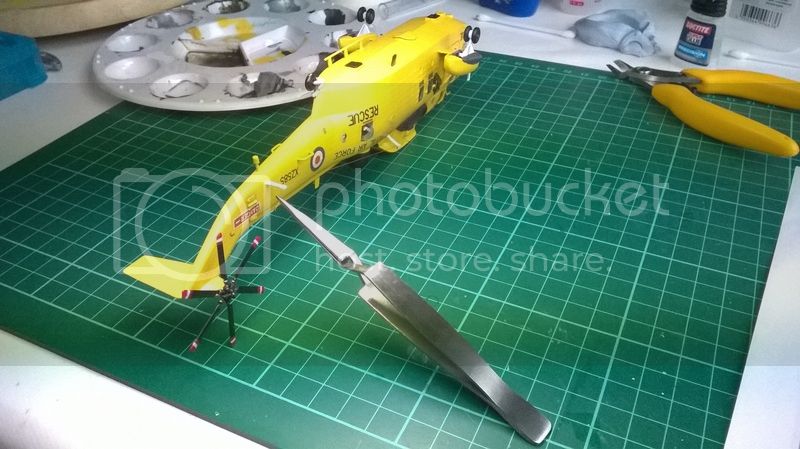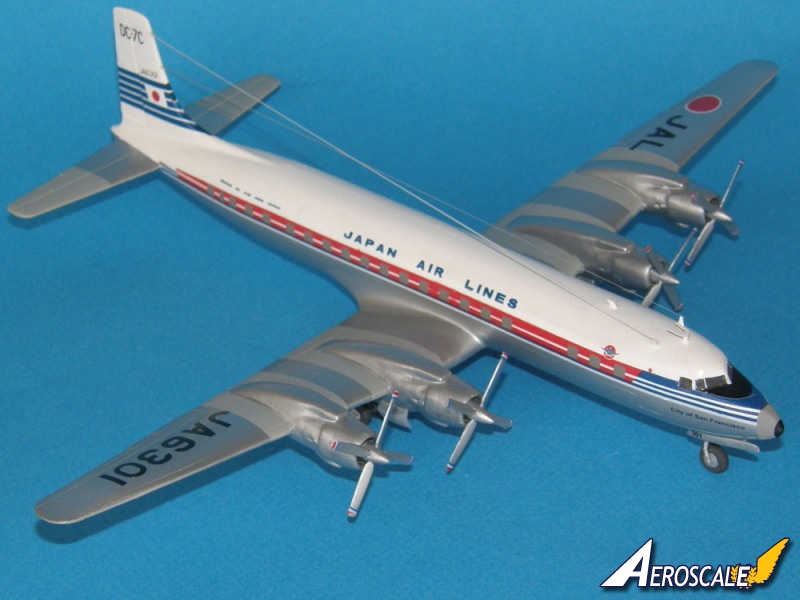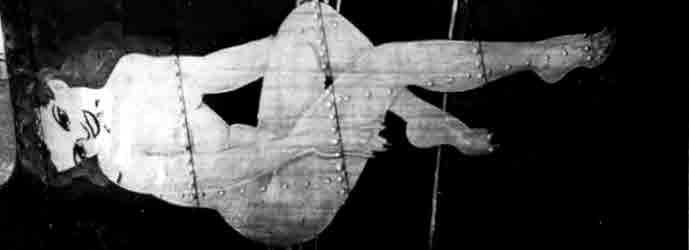Attaching a piece of stretched sprue from the aerial mast of a model to it's verticle stabilizer drives me batty. It often takes me half an hour or more to do it, and usually more than one attempt. I've used CA and Bondic.
Does anyone out there have a special method?
Gary
General Aircraft
This forum is for general aircraft modelling discussions.
This forum is for general aircraft modelling discussions.
Hosted by Jim Starkweather
My bane, attaching the aerial
Posted: Thursday, November 19, 2015 - 05:26 PM UTC
drabslab

Joined: September 28, 2004
KitMaker: 2,186 posts
AeroScale: 1,587 posts

Posted: Thursday, November 19, 2015 - 05:36 PM UTC
Hai,
From your description, I am not really sure what you are trying to do.
However, I do often attach stretched sprue to fuselages as antenna.
The trick I use is to drill a small hole in the fuselage with a 0.4mm drill.
These drills are sold for use in a "dremel drilling machine" but for modelling purposes you can easily hold such little drill between your fingers and spin it around.
In absence of a drill, a heated needle can make a suitable hole as well but the chance of ruinign the surroundign plastic is rather high
I hope this helps
From your description, I am not really sure what you are trying to do.
However, I do often attach stretched sprue to fuselages as antenna.
The trick I use is to drill a small hole in the fuselage with a 0.4mm drill.
These drills are sold for use in a "dremel drilling machine" but for modelling purposes you can easily hold such little drill between your fingers and spin it around.
In absence of a drill, a heated needle can make a suitable hole as well but the chance of ruinign the surroundign plastic is rather high
I hope this helps

spaarndammer

Joined: January 28, 2007
KitMaker: 1,945 posts
AeroScale: 388 posts

Posted: Thursday, November 19, 2015 - 05:47 PM UTC
I never did it myself (maybe too chicken or too lazy), but they way you did it was also the way it was described in a modelling book (F.A.Q. aircraft it was I think) and how it was described made sense to me. So I don't think your method isn't that bad. I would have tried it in a similar way.
Drabslabs suggestion to make a small hole in the stabilizer and start from there by putting the aerial line it with a drop of superglue is indeed worth trying. It will give a solid fix of one side of the line. Then a drop of glue on the mast, put the line on it and let it dry and then cut off any excess.

Jelger
Drabslabs suggestion to make a small hole in the stabilizer and start from there by putting the aerial line it with a drop of superglue is indeed worth trying. It will give a solid fix of one side of the line. Then a drop of glue on the mast, put the line on it and let it dry and then cut off any excess.

Jelger
KelticKnot

Joined: May 11, 2015
KitMaker: 768 posts
AeroScale: 656 posts

Posted: Thursday, November 19, 2015 - 06:06 PM UTC
I recently completed my Sea King antenna using the finest thread i could find. As Drabslab suggests, i drilled the tiniest hole to affix one end and then used the weight of my grip tweezers to tension the thread whilst i glued it at the other. Worked a treat.

I suppose it depends on the scale you're working in but stretching sprue seems like a lot of effort to me.

I suppose it depends on the scale you're working in but stretching sprue seems like a lot of effort to me.

drabslab

Joined: September 28, 2004
KitMaker: 2,186 posts
AeroScale: 1,587 posts

Posted: Thursday, November 19, 2015 - 06:12 PM UTC
Stretching sprue is not only an effort, the thickness of the resulting "wire" is also not a constant.
Better alternatives are:
- very thin fishing wire
- very fine copper wire as used for wiring some computer equipment
the negative of these options is that you need to color them.
There is also very thin "evergreen plastic" on the market. It may be fairly expensive for what it is (and I don't have it), but one package serves you a lifetime
Better alternatives are:
- very thin fishing wire
- very fine copper wire as used for wiring some computer equipment
the negative of these options is that you need to color them.
There is also very thin "evergreen plastic" on the market. It may be fairly expensive for what it is (and I don't have it), but one package serves you a lifetime

Jessie_C


Joined: September 03, 2009
KitMaker: 6,965 posts
AeroScale: 6,247 posts

Posted: Friday, November 20, 2015 - 12:49 AM UTC
You can also try elastic monofilament sewing thread or fishing leader. Its great advantage is that it's stretchy, so you can get it nice and taut without worrying about clumsy fingers knocking it away.
I like to carve a tiny notch in the leading edge of the fin to give the drill bit something to seat into so it doesn't skip away when you turn it. (assuming of course, that my antenna leads actually start on the leading edge instead of the top. If it does start at the top, a nifty trick is to get a piece of microtube, drill the top of the fin and superglue in the tube. After painting, run the antenna material into the tube, superglue, and quickly bend it over so it leads in the right direction. Once the glue hardens, use Paul's technique of suspending tweezers or a clothespin to tighten the antenna while you're gluing the other end in place.
Here's a DC-7 where I used the drill the fin technique:

I like to carve a tiny notch in the leading edge of the fin to give the drill bit something to seat into so it doesn't skip away when you turn it. (assuming of course, that my antenna leads actually start on the leading edge instead of the top. If it does start at the top, a nifty trick is to get a piece of microtube, drill the top of the fin and superglue in the tube. After painting, run the antenna material into the tube, superglue, and quickly bend it over so it leads in the right direction. Once the glue hardens, use Paul's technique of suspending tweezers or a clothespin to tighten the antenna while you're gluing the other end in place.
Here's a DC-7 where I used the drill the fin technique:

Posted: Friday, November 20, 2015 - 01:26 AM UTC
Thank you for the great answers! I have drilled into the verticle stab before when the angle provided wouldn't break the sprue.
But I think I will have to give up the sprue and try monofilament. I always liked that the sprue can be tightened with heat. I imagine that monofilament's properties will be conducive to being either stretched or heat shrunk.
Using locking tweezers to maintain tension should help me if I can keep the line on the needle-point provided by most aircraft model antenna masts.
Fantastic looking JAL airliner!
I appreciate your help,
Gary
But I think I will have to give up the sprue and try monofilament. I always liked that the sprue can be tightened with heat. I imagine that monofilament's properties will be conducive to being either stretched or heat shrunk.
Using locking tweezers to maintain tension should help me if I can keep the line on the needle-point provided by most aircraft model antenna masts.
Fantastic looking JAL airliner!
I appreciate your help,
Gary

Bink123

Joined: June 23, 2008
KitMaker: 414 posts
AeroScale: 364 posts

Posted: Friday, November 20, 2015 - 05:40 PM UTC
The aabsolute best thing to use is elastic thread. EZ Line - used by the model railroading community for telephone/power lines betweeen poles, or elastic thread used by the knitters for sweater cuffs and in socks.
Use CA glue to attach it. It is stretchy and so if knocked does not break.. Check the Wingnut Wings website for information on EZ line.
Use CA glue to attach it. It is stretchy and so if knocked does not break.. Check the Wingnut Wings website for information on EZ line.
Joel_W

Joined: December 04, 2010
KitMaker: 11,666 posts
AeroScale: 7,410 posts

Posted: Friday, November 20, 2015 - 09:19 PM UTC
Gary,
Old habits are hard to break, so I'm still a stretch sprue kind of guy. When possible I prefer to drill a small hole that I can glue the stretched sprue in with Extra thin. For attaching to an antenna, the hole drilling is an non-option. For that I very carefully notch the antenna so that I at least removed the paint. I also have the model resting on it's side in a box so that I can using Extra thin applied with a pin, attach the sprue to the notch. I hold the stretched sprue in position with a pair of tweezers. Takes like 30 seconds to bond. Then I let it cure for a while. using nail clippers, I trim the sprue antenna. Then using a birthday candle under the sprue, I shrink it till it pops tight.
Joel
Old habits are hard to break, so I'm still a stretch sprue kind of guy. When possible I prefer to drill a small hole that I can glue the stretched sprue in with Extra thin. For attaching to an antenna, the hole drilling is an non-option. For that I very carefully notch the antenna so that I at least removed the paint. I also have the model resting on it's side in a box so that I can using Extra thin applied with a pin, attach the sprue to the notch. I hold the stretched sprue in position with a pair of tweezers. Takes like 30 seconds to bond. Then I let it cure for a while. using nail clippers, I trim the sprue antenna. Then using a birthday candle under the sprue, I shrink it till it pops tight.
Joel
Posted: Saturday, November 21, 2015 - 02:28 AM UTC
There are a variety of materials and methods I use.
There is something called "binding wire" for jewelry that comes in many small diameters. Here is an example available on eBay right now: http://www.ebay.com/itm/IRON-BINDING-WIRE-FOR-SOLDERING-0-018-0-45mm-JEWELRY-REPAIR-TOOL-/151865834709?hash=item235be8bcd5:g:jdwAAOSwpDdVfyFO
What is great about this stuff is that you can stretch it and then cut to size. I usually use this when I have a length of wire to place on the top of the post on a vertical stabilizer that will meet up with the top of an antenna post behind the cockpit.
The big negative to this item is that if you jar it you can easily bend it out of shape. It won't spring back. Then you have to start over. However, it is so relatively inexpensive that "it's okay".
Another favorite for me is really thin nylon thread that is either black or clear. To affix this I sometimes drill out a pinhole the forward part of a vertical stabilizer and then insert a tiny ring made of twisted wire. At the other end I will drill a small hole in the after surface of the antenna post, or into the fuselage entry point itself, I will glue the nylon thread end there with crazy glue. It makes for a solid join. Then I will run the wire to the ring and tie it off taut, then glue it in place. That makes for a fairly attractive appearance.
One of these days I will try the product called EZ-line but I will never attempt stretched sprue. I tried it once or twice years ago but never make it work.
There is something called "binding wire" for jewelry that comes in many small diameters. Here is an example available on eBay right now: http://www.ebay.com/itm/IRON-BINDING-WIRE-FOR-SOLDERING-0-018-0-45mm-JEWELRY-REPAIR-TOOL-/151865834709?hash=item235be8bcd5:g:jdwAAOSwpDdVfyFO
What is great about this stuff is that you can stretch it and then cut to size. I usually use this when I have a length of wire to place on the top of the post on a vertical stabilizer that will meet up with the top of an antenna post behind the cockpit.
The big negative to this item is that if you jar it you can easily bend it out of shape. It won't spring back. Then you have to start over. However, it is so relatively inexpensive that "it's okay".
Another favorite for me is really thin nylon thread that is either black or clear. To affix this I sometimes drill out a pinhole the forward part of a vertical stabilizer and then insert a tiny ring made of twisted wire. At the other end I will drill a small hole in the after surface of the antenna post, or into the fuselage entry point itself, I will glue the nylon thread end there with crazy glue. It makes for a solid join. Then I will run the wire to the ring and tie it off taut, then glue it in place. That makes for a fairly attractive appearance.
One of these days I will try the product called EZ-line but I will never attempt stretched sprue. I tried it once or twice years ago but never make it work.
Removed by original poster on 11/21/15 - 21:41:11 (GMT).

Bink123

Joined: June 23, 2008
KitMaker: 414 posts
AeroScale: 364 posts

Posted: Saturday, November 21, 2015 - 03:52 AM UTC
Posted: Saturday, November 21, 2015 - 04:12 AM UTC
Thanks for that video. It's settled...I gotta get some EZ line. I have my first WWI biplane locked into an upcoming campaign.
Joel,
Thanks for the tip of notching the antenna mast. I'll add that ro the other tips I've gotten in this thread.
One of my huge problems is unsteady hands. Trying to freehand that sprue into place, the end can be waving back and forth like a metronome.
Thanks again, everyone!
Gary

Bink123

Joined: June 23, 2008
KitMaker: 414 posts
AeroScale: 364 posts

Posted: Saturday, November 21, 2015 - 10:22 AM UTC
I've used EZ Line for years for biplane rigging. Check out the WingNuts site for info.

ubisuck

Joined: December 20, 2012
KitMaker: 461 posts
AeroScale: 85 posts

Posted: Saturday, November 21, 2015 - 10:09 PM UTC
Quoted Text
The absolute best thing to use is elastic thread. EZ Line - used by the model railroading community for telephone/power lines between poles, or elastic thread used by the knitters for sweater cuffs and in socks.
Use CA glue to attach it. It is stretchy and so if knocked does not break.. Check the Wingnut Wings website for information on EZ line.
This stuff is fantastic, I received, last week) two roll of black & white thin wires for making the cables inside a cockpit. 100'for $9 canadian
Posted: Monday, November 23, 2015 - 12:49 PM UTC
I had a hard time finding it available here in Australia. Everyone was out of stock in fine black, but found one site that had fine white. Somebody was trying to sell a spool of it on ebay for 44 bucks. Have they quit making it, or something?
 |
















